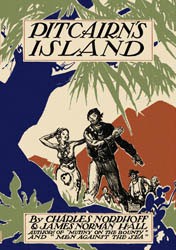 First edition cover | |
| Author | Charles Nordhoff and James Norman Hall |
|---|---|
| Language | English |
| Series | The Bounty Trilogy |
| Genre | Historical fiction |
| Publisher | Little, Brown and Company |
Publication date | 1934 |
| Publication place | United States |
| Media type | Print (Hardcover and paperback) |
| Preceded by | Mutiny on the Bounty and Men Against the Sea |
Pitcairn's Island is the third installment in the fictional trilogy by Charles Nordhoff and James Norman Hall about the mutiny aboard HMS Bounty. It is preceded by Mutiny on the "Bounty" and Men Against the Sea . The novel first appeared in The Saturday Evening Post (from 22 September 1934 through 3 November 1934) then was published in 1934 by Little, Brown and Company. Chapters I–XV are told in the third person, and Chapters XVI–XXI are told in the first person by John Adams. The epilogue that follows is in the third person.